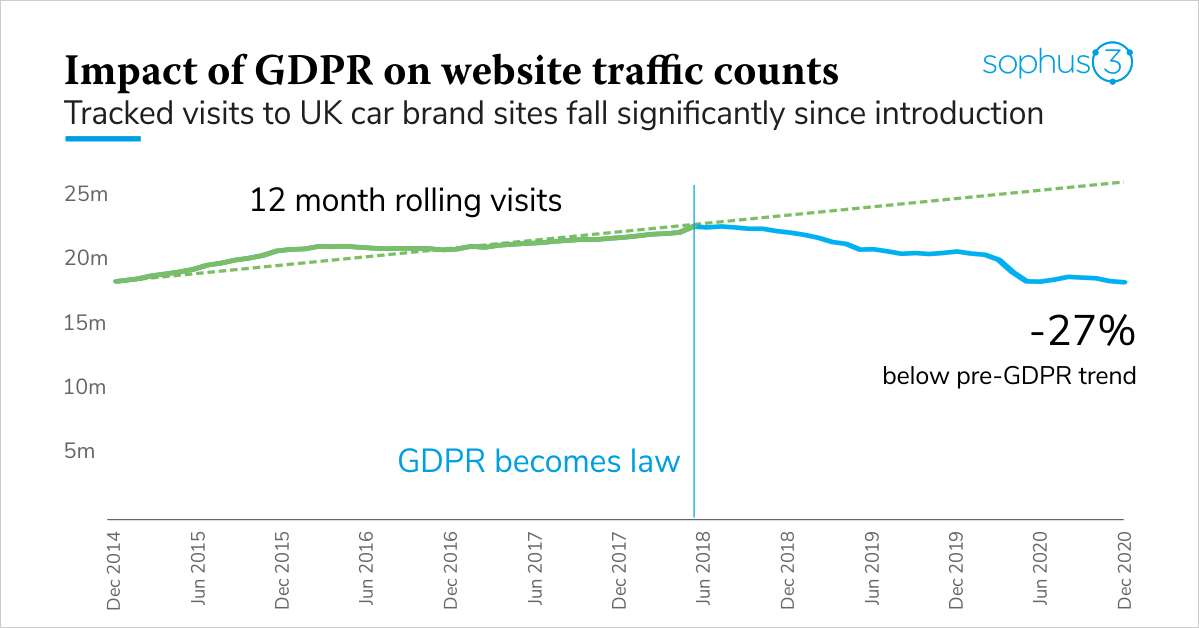Sophus3 Briefing paper – July 2021

Maintaining digital analytics for car brands within new privacy and consent frameworks
What is happening?
A combination of changes is upending the way organisations can track and interact with users of their digital channels.
These changes are a response to consumers’ privacy concerns, but they also represent a tussle between the ‘tech giants’ to increase their power and control over digital markets whilst appearing to be privacy advocates.
What the changes are
GDPR, the General Data Protection Regulation, which came into effect in 2018, required owners of digital platforms to gain the assent of visitors for their personal data to be used for analytical or marketing purposes. This has already severely curtailed the way websites can track and engage with visitors.
However, further changes are in train:
Google Chrome has announced its privacy sandbox which will end the use of 3rd party cookies, prevent ‘digital fingerprinting’, and introduce ‘Federated Learning of Cohorts (FLoC)’ as an anonymised way of targeting advertising to digital audiences. (In June Google introduced more uncertainty when it announced it was postponing the introduction of FLoC and would be retaining third party cookie support until 2023, saying “more time is needed across the ecosystem to get this right.”)
Mozilla Firefox SmartBlock could prevent cross-domain tracking by disabling scripts from external domains.
Apple is introducing ‘Tracking Opt-in’ on iOS devices which requires users to give express permission to be tracked whilst using an app or related websites.
The impact of the new initiatives
The most disruptive impact will be on digital advertising. The complete disabling of third-party cookies (tracking codes that are placed on a visitor’s device by a site other than the one they are visiting) means advertisers will be unable to identify individuals based on their browsing history and recorded interests. This throws into disarray key parts of the digital advertising business model and will make it difficult for car brands — and others — to run targeted campaigns and measure their effectiveness.
Of more concern from Sophus3’s point of view, is the impact of these changes on the analytic capabilities of car brands. Whilst the continuing use of 1st party cookies will allow a partial view of audience behaviour within a digital platform in isolation, the challenge will be to provide a holistic understanding of consumer behaviour within the wider digital automotive market-space and to measure the performance of those isolated platforms relative to each other.
What the data shows
At the end of 2020 Sophus3 undertook an audit of car brand websites in the UK to assess their progress in complying with the GDPR requirement to obtain consent to use cookies to track visitors. Two things came out of this audit that were alarming. Firstly, few of the consent mechanisms that brands had created were strictly compliant with the legislation. Whether by accident or design, many brands had laid themselves open to the penalties defined in the legislation. Secondly, those brands that had complied most fully, had experienced a major loss of traffic as site visitors withheld consent to the use of cookies and were rendered invisible.

Sophus3 estimates that by the end of 2020 the number of visitors counted on car brand sites in the UK was down by -27% as a result of GDPR compliance.
This audience invisibility can only worsen because of the further changes that the different tech companies have since announced.
Sophus3’s response
Having been aware of these changes since they were first proposed, Sophus3 is developing a strategic and technical response to allow the continuing analysis of digital audiences and the benchmarking of digital platforms.
At the core of this is a consent free analytics system which we have named TrueAudience. This uses page view data and referring URLs to determine traffic numbers. This reduction in scope allows us to collect traffic without the use of personal data (IDs, IP addresses, digital fingerprints) or cookies. Thus, while limiting the metrics, we can get the full traffic. Layered with data modelled from the retained, ‘consented’ traffic, we can provide more detailed insight into visitor behaviour.
Our timeline
Over the summer months Sophus3 will be commencing a trial of our TrueAudience solution on the digital platforms of a partner brand.
In the autumn we will be publishing the results of the trial within a whitepaper laying out in more detail the challenges the evolving privacy and consent framework presents.
Before the end of the year, we will host a half-day, virtual roundtable discussion laying out the basis of our solution and the need to build a sector-wide, collaborative response to the challenges.
We invite you, and your organisation’s participation within these endeavours. To be kept informed please complete the registration form below or email contact@sophus3.com.
Error: Contact form not found.

